|
|
|
Sort Order |
|
|
|
Items / Page
|
|
|
|
|
|
|
| Srl | Item |
| 1 |
ID:
069084
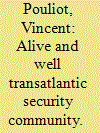

|
|
|
| 2 |
ID:
171712
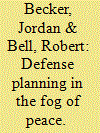

|
|
|
|
|
| Summary/Abstract |
Resource allocation to and within defense budgets is grand strategy. NATO and the EU coordinate defense planning and encourage fair burden-sharing among their members. We analyze the effect of agreed planning processes, namely the “NATO Defense Planning Process (NDPP)” on the conversion of political will to resources and then to capabilities development across the transatlantic security community. In a “fog of peace” featuring diverse threats, and in which allies may disagree on strategic rivals and sources of risk, national and regional political economies shape strategy, not the other way around.
|
|
|
|
|
|
|
|
|
|
|
|
|
|
|
|
| 3 |
ID:
154461
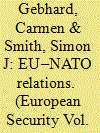

|
|
|
|
|
| Summary/Abstract |
This article provides the framework for the contributions to this special issue. It first puts the theme into context and outlines the main issues that justify further analytical engagement with European Union (EU)–North Atlantic Treaty Organization (NATO) relations to the extent we propose here. We then provide some historical background to frame the discussion, and in doing so also outline the current state of interaction between the EU and NATO. We then briefly contextualise the changing strategic environment shaping the relationship, including recent proposals to implement their declared “strategic partnership”. This introduction then presents an overview of the existing literature to set the stage for a renewed look at the research agenda that has emerged over the last two decades. We close with an outline of the individual contributions to this special issue, which are presented in two sections: one focusing on theoretical and conceptual approaches to the study of EU of EU–NATO relations, and one on the inter-organisational relationship in practice, followed by a concluding synopsis and outlook.
|
|
|
|
|
|
|
|
|
|
|
|
|
|
|
|
| 4 |
ID:
056437
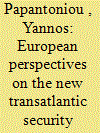

|
|
|
| 5 |
ID:
186536
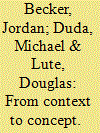

|
|
|
|
|
| Summary/Abstract |
This article introduces ten essays capturing ten panel discussions held by the Department of Social Sciences at the United States Military Academy on 3-4 February 2022, in support of the drafting of NATO’s 2022 Strategic Concept. While the shadow of the Russo-Ukrainian war hung heavy over the proceedings, participants sought to take both a long and a broad view, contemplating NATO’s role in a changing international order. NATO allies must assimilate these changes into their collective and national strategies, but they are first and foremost agents themselves, whose strategies can and should shape the future. The participants asked challenging questions about what international order(s) might look like in the proximate future, and how NATO allies could shape that proximate future. The authors of this introductory essay contend that while simultaneous competition with China and Russia will be a (perhaps the) central feature of the international security landscape for years to come, the act of competing does not a Strategic Concept make. Allies must grapple with interrelated issues ranging from the evergreen question of transatlantic burden-sharing to the assimilation of emerging technologies into strategic and operational planning. The transatlantic security architecture anchored by NATO will have to be incorporated into a broader, global security network to manage competition with China and Russia while holding fast to the democratic values that are at NATO’s heart.
|
|
|
|
|
|
|
|
|
|
|
|
|
|
|
|
| 6 |
ID:
077907
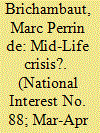

|
|
|
| 7 |
ID:
175455
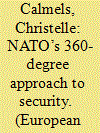

|
|
|
|
|
| Summary/Abstract |
In the mid-2010s NATO allies were facing the resurgence of a Russian threat at their borders, as well as terrorist actions in Europe and the MENA region. This evolving security environment provoked heated talks both within and outside NATO on its adaptation, often depicted as being the sign of irreconcilable disagreements. Conversely, this article argues that the "NATO 360-degree" concept adopted during the Warsaw Summit shows cohesion between the allies thanks to the Alliance's decision-making process. As a security community, member states were incentivised to find common grounds despite their diverging interests, which resulted in this new concept encompassing the "arc of insecurity". Its subsequent implementation also confirms the cohesion hypothesis, despite its obvious refocusing towards the East and collective defence. This article will first present the diverging threat perceptions within the Alliance. It will then focus on the implementation of the "NATO 360-degree" concept, promoted during the Warsaw summit, to finish with an initial assessment of the changes at work.
|
|
|
|
|
|
|
|
|
|
|
|
|
|
|
|
| 8 |
ID:
062382
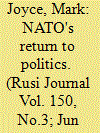

|
|
|
| 9 |
ID:
090607
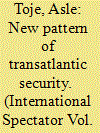

|
|
|
|
|
| Publication |
2009.
|
| Summary/Abstract |
Transatlantic relations are in flux: NATO's struggle for self preservation; the diminished importance of Europe in American geopolitics; the semi-failure of European foreign policy integration; and the absence of a grand bargain among Europe's leading powers. These four trends are making the current transatlantic order unsustainable.
|
|
|
|
|
|
|
|
|
|
|
|
|
|
|
|
| 10 |
ID:
132095
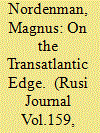

|
|
|
|
|
| Publication |
2014.
|
| Summary/Abstract |
Since the 1990s, Denmark, Norway, Sweden and Finland have worked as NATO members or partners, participating in expeditionary operations and playing political leadership roles in the transatlantic security community. Today, however, the Nordic-Baltic security environment is changing rapidly, a trend only further accelerated by the Ukraine crisis. Magnus Nordenman argues that the emerging strategic environment will force the Nordic nations to focus on challenges closer to home, and that their current defence constructs will be challenged if they are not further refined and if co-operation is not extended
|
|
|
|
|
|
|
|
|
|
|
|
|
|
|
|
| 11 |
ID:
079911
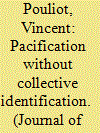

|
|
|
|
|
| Publication |
2007.
|
| Summary/Abstract |
Does the emergence of a security community require a collective identity? This constitutive relationship has been hypothesized by prominent scholars from Deutsch to Adler & Barnett. Yet the Russian-Atlantic case shows that collective identification is not a necessary condition for a nascent security community to emerge. In less than two decades, the relationship between Russia and the transatlantic community has quickly transformed from a deep-seated rivalry structured by the specter of mutual assured destruction to a partnership in which the possibility of military confrontation has undeniably receded. Although bones of contention and power struggles continue to abound, empirical indicators attest to the emergence of a nascent Russian-Atlantic security community. But survey data also show that Russian and Western peoples do not meaningfully identify with one another. While the lack of we-ness certainly helps explain the striking instability of the post-Cold War rapprochement between Russia and the transatlantic community, it also recalls the need for constructivists to pay attention to other variables than mutual representations in the study of international peace. As a way forward, the article advocates a practice turn in the study of security communities: peace exists as a social fact when diplomacy becomes the self-evident practice among security elites to solve interstate disputes
|
|
|
|
|
|
|
|
|
|
|
|
|
|
|
|
| 12 |
ID:
086321
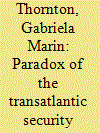

|
|
|
|
|
| Publication |
2008.
|
| Summary/Abstract |
The transatlantic security project - with its central focus on the North Atlantic Treaty Alliance (NATO) - was by many accounts a phenomenon that occurred because of the bipolarity of the international system during the Cold War. The main contention of this article is that the foundation of the transatlantic security project was built on a paradox. The transatlantic security project may have been the right response to the security challenges of the Cold War, but the project, as conceived originally, was not able to meet the new challenges brought by the fall of the Soviet Union. With the Cold War gone, the nature of the power relations between the main pillars of the transatlantic relationship, the US and the EU, started to change. Therefore, what best defines the idiosyncratic existence of the transatlantic space de notre jours? In order to answer this question, this article is structured as follows. First, I analyse the paradox of the transatlantic security project. I then explore the relationship between the newly created EU institutions and NATO. Third, I claim that the Clinton administration tried to solve the transatlantic paradox by taming European power, that is, by making efforts to tie the EU's security institutions into NATO. By contrast, the Bush II presidency has tried to divide European power. I conclude by arguing that references to the transatlantic relationship, as to a monolithic bloc - a way in which it was conceived and referred to during the Cold War - no longer reflect the new transatlantic reality. A new transatlantic security space has been emerging; a more fragmented space - a space invested with a new dynamic, in which actors' security and geo-political concerns have started to diverge.
|
|
|
|
|
|
|
|
|
|
|
|
|
|
|
|
| 13 |
ID:
055340
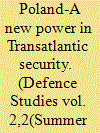

|
|
|
| 14 |
ID:
057662
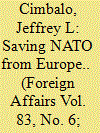

|
|
|
|
|
| Publication |
Nov-Dec 2004.
|
| Summary/Abstract |
Long the bulwark of the transatlantic security relationship, NATO now faces a threat from within Europe itself. The proposed EU constitution makes clear that the new Europe seeks to balance rather than complement U.S. power-making European political integration the greatest challenge to U.S. influence in Europe since World War II. Washington must begin to adapt accordingly.
|
|
|
|
|
|
|
|
|
|
|
|
|
|
|
|
| 15 |
ID:
131633
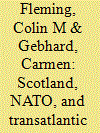

|
|
|
|
|
| Publication |
2014.
|
| Summary/Abstract |
This article explores the political and strategic implications of Scottish Independence for existing transatlantic security arrangements. It examines the potential institutional, legal and political obstacles Scotland might face during the transition to independence and discusses the specific challenges in the area of security and defence, including the nuclear issue and the question of what form an independent Scottish Defence Force (SDF) would need to take to allow and facilitate integration in transatlantic security structures. It argues that a number of strategic and political issues could be mitigated in the course of negotiations between Edinburgh and London. Moreover, Scotland's geostrategic position and political orientation make it an important prospective partner in international security cooperation across the Eastern Atlantic, High North and North Sea, which suggests that an advanced partnership with NATO, and eventually full membership, seems like an option that is both politically viable and more likely than any scenario that predicts seeing an independent Scotland (IS) outside these structures. This challenges some of the main strategic and security political arguments against independence and thus seeks to spark a debate about the realistic options for Scotland should it become independent after 2016.
|
|
|
|
|
|
|
|
|
|
|
|
|
|
|
|
| 16 |
ID:
061768
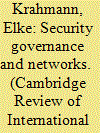

|
|
|
|
|
| Publication |
2005.
|
| Summary/Abstract |
The end of the Cold War has not only witnessed the rise of new transnational threats such as terrorism, crime, proliferation and civil war; it has also seen the growing role of non-state actors in the provision of security in Europe and North America. Two concepts in particular have been used to describe these transformations: security governance and networks. However, the differences and potential theoretical utility of these two concepts for the study of contemporary security have so far been under-examined. This article seeks to address this gap. It proposes that security governance can help to explain the transformation of Cold War security structures, whereas network analysis is particularly useful for understanding the relations and interactions between public and private actors in the making and implementation of national and international security policies.
|
|
|
|
|
|
|
|
|
|
|
|
|
|
|
|
| 17 |
ID:
056393
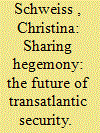

|
|
|
| 18 |
ID:
183917
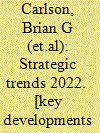

|
|
|
|
|
| Publication |
Switzerland, Center for Security Studies, 2022.
|
| Description |
115p.pbk
|
| Series |
Center for Security Studies
|
| Standard Number |
9783905696851
|
|
|
|
|
|
|
|
|
|
|
|
Copies: C:1/I:0,R:0,Q:0
Circulation
| Accession# | Call# | Current Location | Status | Policy | Location |
| 060160 | 341.2333/CAR 060160 | Main | On Shelf | General | |
|
|
|
|
| 19 |
ID:
066968
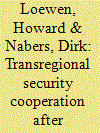

|
|
|
| 20 |
ID:
096851
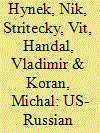

|
|
|
|
|
| Publication |
2009.
|
| Summary/Abstract |
The article examines the reactions of selected European states to the US-performed 'reset' in relations with Russia and explores the ways in which they have been adapting to the new set-up. The article is divided into three parts: after the discussion of the substantive continuity and limited change in US foreign and security policy (USFSP), the multilateral and bilateral dimensions of USFSP procedure are examined through John Ruggie's theoretical observations. The second part of the article deals with implications of the USFSP for Central-Eastern European countries. This part begins with a discussion of Russian attempts to wheedle Europe into embracing its plans for new European security architecture. The next section sheds light on the unexpected process of strategic realignment of the region (USA/NATO/EU/CSDP) and simultaneous transformation of the special relationship with the USA into 'normal life'. The third part of the article tackles the implications of heightened US-Russian bilateralism for Germany. Authors' findings, many of them based on conducted elite interviews, suggest the contrary process, namely Germany's strengthened multilateral commitment to the EU and specifically to European Security and Defence Policy, limiting the bilateral option to energy trade with Russia. What follows are concluding remarks.
|
|
|
|
|
|
|
|
|
|
|
|
|
|
|
|
|
|
|
|
|